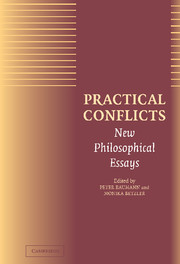Book contents
- Frontmatter
- Contents
- Foreword
- 1 Introduction: Varieties of Practical Conflict and the Scope of Practical Reason
- 2 Willing the Law
- 3 The Myth of Egoism
- 4 Thinking about Conflicts of Desire
- 5 Putting Together Morality and Well-Being
- 6 The Second Worst in Practical Conflict
- 7 Personal Practical Conflicts
- 8 Sources of Practical Conflicts and Reasons for Regret
- 9 Conflicting Values and Conflicting Virtues
- 10 Involvement and Detachment: A Paradox of Practical Reason
- 11 Outcomes of Internal Conflicts in the Sphere of Akrasia and Self-Control
- 12 Are There Insolvable Moral Conflicts?
- 13 Moral Dilemmas of Transitional Justice
- 14 Do Conflicts Make Us Free?
- List of Contributors
- Name Index
- Subject Index
- References
6 - The Second Worst in Practical Conflict
Published online by Cambridge University Press: 02 December 2009
- Frontmatter
- Contents
- Foreword
- 1 Introduction: Varieties of Practical Conflict and the Scope of Practical Reason
- 2 Willing the Law
- 3 The Myth of Egoism
- 4 Thinking about Conflicts of Desire
- 5 Putting Together Morality and Well-Being
- 6 The Second Worst in Practical Conflict
- 7 Personal Practical Conflicts
- 8 Sources of Practical Conflicts and Reasons for Regret
- 9 Conflicting Values and Conflicting Virtues
- 10 Involvement and Detachment: A Paradox of Practical Reason
- 11 Outcomes of Internal Conflicts in the Sphere of Akrasia and Self-Control
- 12 Are There Insolvable Moral Conflicts?
- 13 Moral Dilemmas of Transitional Justice
- 14 Do Conflicts Make Us Free?
- List of Contributors
- Name Index
- Subject Index
- References
Summary
TIES FOR OPTIMALITY
Rational agents do the best they can. That is to say, they choose an option from those available to them that is the best, all things considered, among those available options. This maximizing recipe creates no difficulty in case there is exactly one option that is best among the options available to agent X. agent X should choose the optimal option.
Suppose, however, that like Buridan's Ass, X faces a predicament where two or more options are optimal. Which option should X choose? It does no good to say that all optimal options are equally optimal. X knows that. But X may still want guidance as to what to do.
To insist that rational agents never face decision problems where more than one available option is optimal is to disallow the possibility that decision makers can judge distinct options to be equally valuable. If A and B are equally valuable, all things considered, and belong to set of feasible options S, then the subset of S consisting of the pair {A, B} could coherently be a set of available options. Both A and B are equally optimal relative to that set of available options.
Buridan's Ass X need not be frozen in indecision, leading to doom. X will choose for the best no matter which optimal option X chooses. X may not feel the need for guidance between equally optimal options.
- Type
- Chapter
- Information
- Practical ConflictsNew Philosophical Essays, pp. 159 - 171Publisher: Cambridge University PressPrint publication year: 2004



